Entries in Shame (41)
EFA Noms Honor Plenty of Foreign Film Oscar Contenders
 Saturday, November 3, 2012 at 5:00PM
Saturday, November 3, 2012 at 5:00PM The European Film Awards will be held in Malta this year on December 1st, and as per usual they are honoring plenty of possible nominees in Oscar's Foreign Language Film category as well as films that are a little too outre for Oscar (last year Melancholia, completely ignored by Oscar, did well and this year that honor goes to Steve McQueen's Shame)
BEST EUROPEAN FILM
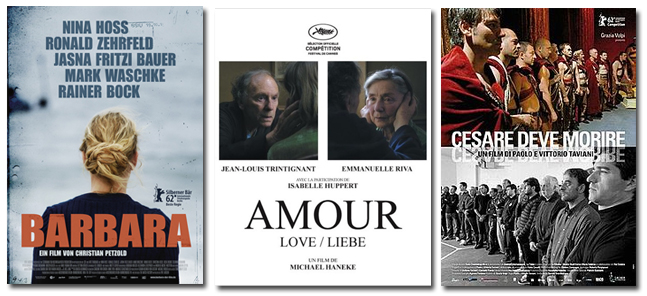
- Amour (Austria's Oscar Submission)
- Barbara (Germany's Oscar Submission)
- Caesar Must Die (Italy's Oscar Submission)
- The Hunt (Denmark)
- The Intouchables (France's Oscar Submission)
- Shame (UK)
Amour appears to be the likely frontrunner here as it leads in nominations but the EFAs are far less predictable than Oscar so anything might happen. Acting nominations, a very handsome director, and more after the jump.
Distant Relatives: Lolita and Shame
 Thursday, March 1, 2012 at 3:00PM
Thursday, March 1, 2012 at 3:00PM Robert here w/ Distant Relatives, exploring the connections between one classic and one contemporary film.
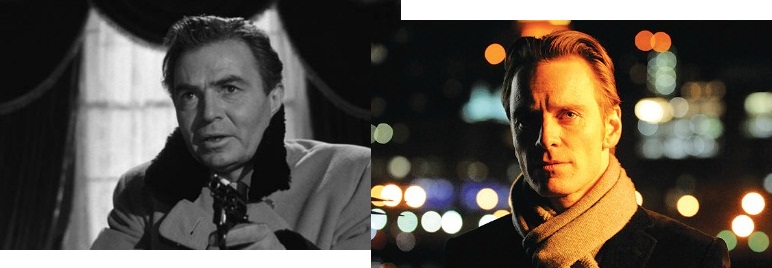
We shouldn't be talking about these things. And by "these things" I don't necessarily mean sex in general. Sex is okay filtered through the acceptable narratives of or cinematic pop-cultural lexicon. The happy conquests of the charismatic man are a fine topic for a film, as are the the constant failings of the empathetic dope. The female sexual experience is okay as along as it kinda mimics the male sexual experience. Basically we're willing to watch attractive actors an actresses roll in the sheets as long as their sex lives are at their own command. We do not take well to stories of people whose sexual desires do the controlling.
Lolita's Humbert and Shame's Brandon are two such people. Though it seems like they have it all. They're attractive, rich, sophisticated, educated and lead lives of effortless good fortune. Brandon's good looks and success place no limits onto the conquests craved by his sex addiction. Humbert's ridiculous luck places him as the sole guardian of a pretty young girl whose already had just enough experience to alleviate him from any guilt. The only thing Humbert and Brandon lack is someone else to blame.
As spectators to their inevitable downward spirals, it's difficult to watch them make all the choices that lead to their sad end and then feel sorry when they get there, especially when they leave casualties in their wake. The films they inhabit don't ask us to sympathize for them with a wink of dramatic irony like A Clockwork Orange or The Godfather (both great films) do with their protagonists. Instead they ask us to observe and then try to grasp the incredibly complex realtionship we have with the power of our own desires.
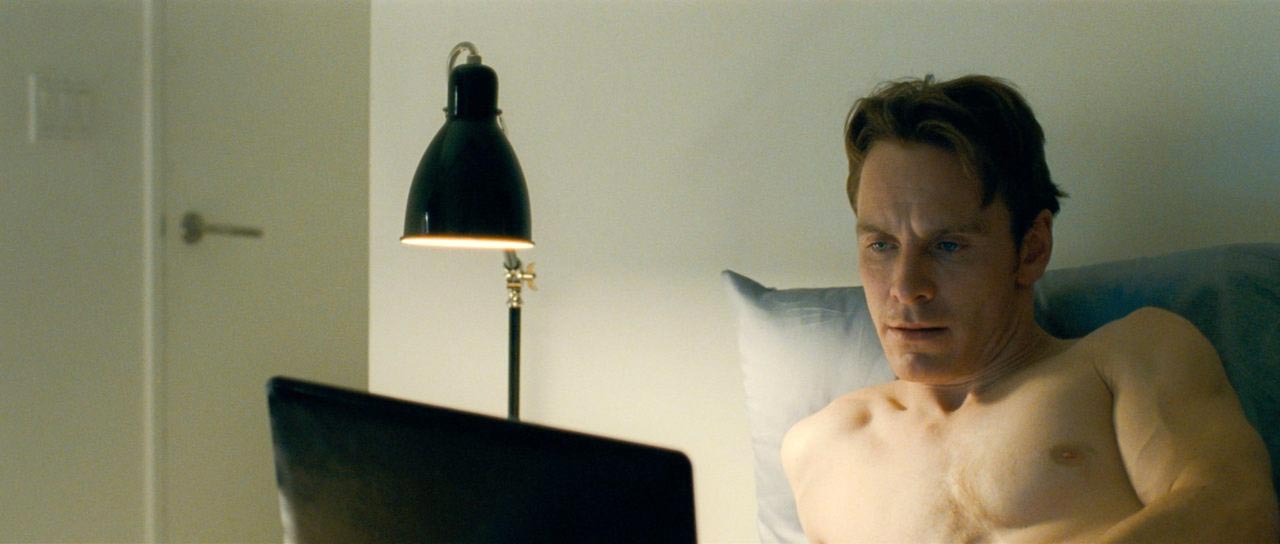
This is such an easy source of drama that on most any evening you can find television shows about addicts and hoarders and attempted interventions. On most supermarket shelves you can find magazines with tales of celebrities suffering from addictions. Psychological damage sells. The best of these paint complex portraits of real people trying to survive in a world that demands they be at war with themselves. The worst of them gleefully invite us to shed our empathies and delight in the chaos. It's difficult to have empathy for someone like Brandon whose problem includes attracting a plethora of beautiful women that would make any man jealous. And it's even more difficult to have empathy for someone like Humbert who preys on children.
Add to this the fact that both films omit any context in which to place our sympathies. Shame clearly suggests that Brandon has been damaged somehow, but we never know how. The most common criticism of the film is of its lack of backstory. But I wonder if such details are relevant. Do certain backstories justify his behaivor while others don't? Or would some at least invite our sympathy more than others? It's easy for us to postpone our emotional investment in someone until we have more details. But that's not what the movie asks of us.
In the case of Humbert, while the novel Lolita clearly sets up his penchant for young girls, the film omits this entirely. I've often wondered how viewers in 1962, who didn't have the backstory of the book reacted when their hero began to covet the young Dolores Haze. Of course the film had little choice than to convert the story into comedy to soften the blow. But there's still a surprising amount of drama and suffering to be had among the proceedings. And comedy or drama, there's only so much you can tiptoe around the central plot of a man lusting for an adolescent.
Then there are the other victims of these men's desires. Brandon's severly depressd sister Sissy, who pursues her sexual needs just as nihilistically as Brandon, but has to be chided and demeaned for it. And there's Humbert's Dolores, who has little time in life to be anything other than an object of temptation. Even her mother, the comedic relief, bumbling, boisterious Charlotte doesn't deserve her fate.
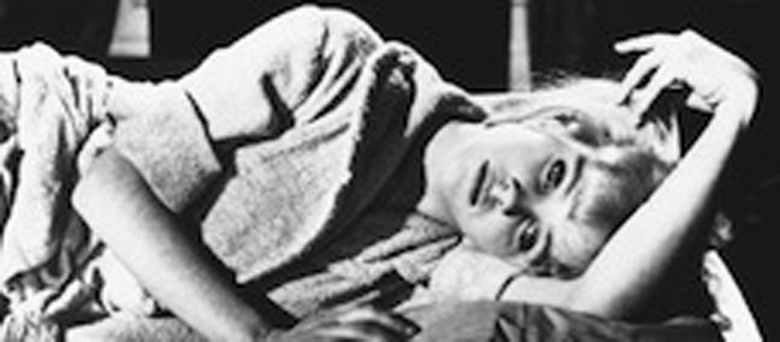
Which leads us to the real question that both of these movies are asking, whether either of these men truly deserve their fates. It's a complicated one, and based on the way audiences have reacted to these stories, over the past few months or past few decades it's a question we're still nowhere near answering. I imagine there's more goodwill present for Fassbender's Brandon since he's not involving himself with anyone who can't give legal consent (yet I can assume that more good judgment has been unknowingly discarded as a result of Fassbender's piercing gaze than Mason's droll sophistication). Then again, Humbert gets what's coming to him. He ends up punished for his crimes. Brandon merely ends up once again at the beginning of the cycle. What goodwill does that invite?
Perhaps the moralities of these films are so difficult to digest because they present not a simple world of monsters and victims, but a complex one of hurt people who hurt people, where the only monsters are us, when we look the other way and demand an easier reality.
'darling leave a link on for me' ♫
 Friday, January 27, 2012 at 11:00PM
Friday, January 27, 2012 at 11:00PM IndieWire and Cinema Blend Reports just keeping coming on the casting of the Charlie Kauffman's musical Frank or Francis. Kate Winslet, Catherine Keener, Paul Reubens and Elizabeth Banks now added to the cast.
Coming Soon Sarah Jessica Parker will now play Gloria Steinem in Lovelace (Demi Moore is out given her troubles. I haven't followed it actually but there are problems, yes?)
Backstage Blogstage interviews Joyful Noise director Todd Graff on his habit of making musicals
Broadway Blog Did you know that Jessica Chastain and Michelle Williams once worked together? Now you do!
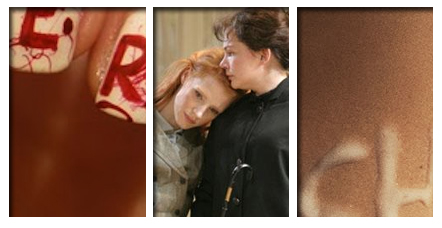
Flavorwire TV inspired nail art. Dexter! (sidenote: omg how bad was season six?)
College Candy super cute video of Melissa McCarthy freaking out about encounters with Brad & Angie and Meryl Streep
Carpetbagger talks to Oscar nominated cinematographer Jeff Cronenwerth (The Girl With the Dragon Tattoo). He met David Fincher on the set of Madonna's "Oh Father!"
Rope of Silicon a new very risque poster for Shame in its international release.
Kenneth in the (212) enjoys Armie Hammer's mug shot a little too much.
24 Frames Brad Pitt is not one of the nominated producers of The Tree of Life, after all (it was "TBA") so only two Oscar nominations this year for Our Brad.
Blooper Reel for The Artist anyone?
And because it's super annoying, but you might want to see it, I've added the 3D Avengers poster after the jump.
Best of Year Pt 2: Sweet 16 from Primordial Ooze to YA Novels
 Monday, January 2, 2012 at 10:11PM
Monday, January 2, 2012 at 10:11PM Part One: I Am Thirty Two Flavors
Other pictures from 2011 that The Film Experience's year wouldn't have been complete without.
Part Two: Honorable Mentions
The year's best movies stretched all the way from the creation to the apocalypse and everywhen in between; time hardly seemed linear in 2011 but immeasurably flexible instead. The year's best films also twisted and shape-shifted in scale and meaning, wrapping big themes around human-sized packages.
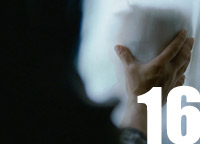 THE TREE OF LIFE (Terrence Malick)
THE TREE OF LIFE (Terrence Malick)
Fox Searchlight. May 27th.
I really didn't know that our Burning Questions columnist Michael C felt so similarly about Terrence Malick's latest so two somewhat agnostic appreciations back-to-back were not intended here at The Film Experience. I greatly admire The Tree of Life's grandiose reach (the creation segment being my favorite chunk) and breathtaking physical beauty but often I felt like I was visiting an impenetrably random museum installation. Still... it's hard to shake the imagery and in a few key sequences -- children playing in poison clouds, brothers crying in tall grass, and especially in the different ways that Mrs O Brien (an ethereal Jessica Chastain) and Mr O'Brien (Brad Pitt's second great performance of the year... can we please give him an Oscar now, people?) touched and taught and looked at their children, the movie was fiercely moving.
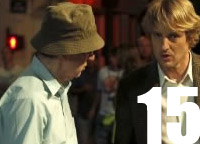 MIDNIGHT IN PARIS (Woody Allen)
MIDNIGHT IN PARIS (Woody Allen)
Sony Pictures Classics. June 10th.
Let's not call it a comeback. Woody Allen has never gone away and his filmography runs the gamut between masterful and mediocre -- sometimes within the very same movie! What sets Midnight in Paris apart from the pack is a conceit so clever and insightful that it works both within the famed auteur's current limitations and as charming cover for them. It's okay that the present feels so tired and one note when hack screenwriter Gil (Owen Wilson) feels exactly this way about the life he's leading. It's definitely okay that the nostalgic past feels shallow and cartoony since nostalgia is fantasy, a very specific escapist (rear) projection. Quibbling is easy -- it's no Purple Rose of Cairo (an Allen masterwork treading somewhat similar ground) -- but why quibble when Corey Stoll is so funny as Hemingway, Adrien Brody is so amusing as Dali "Rhi-no-ce-ros" and Marion Cotillard's muse complicates the movie so beautifully by rejecting its message entirely and exiting the picture with so little fuss.
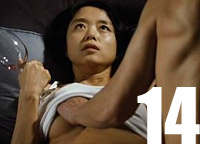 THE HOUSEMAID (Im Sang-soo)
THE HOUSEMAID (Im Sang-soo)
IFC. January 21st.
This erotic melodrama, a remake of a Korean classic (which I have yet to see), is either the year's most elegantly trashy soap opera or its most biting political metaphor for the carnivorous and consequence-free behavior of the super wealthy and the impotent dramatics of the working poor. Maybe both. Either way it's uncomfortably steamy, beautifully filmed, and superly acted (South Korea is where it's at for actresses these days. Period.) It's also unusually entertaining once the bad behavior and catfights begin. I watched it twice in one week when I first saw it and if my schedule weren't so tight, I'd do so again right now.
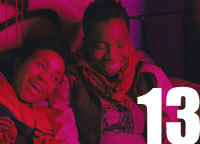 PARIAH (Dee Rees)
PARIAH (Dee Rees)
Focus Features. December 28th.
Two important new voices emerged in queer cinema this year, writer/directors Dee Rees and Andrew Haigh (his Weekend up later in the countdown). Both filmmakers previously directed one documentary-style feature so they weren't in the discussions of "best debuts" but what debuts these narrative features were! Coming out stories are a staple of gay cinema but few of them have carved out as much emotional nuance from raw feeling. Pariah has so much feeling for its characters that it occassional gets distracted with tangential subplots but better too much genuine feeling than not enough of it or the poorly manufactured variety. This story of a shy closeted lesbian high school student (Adepere Oduye, just wonderful) in a rough Brooklyn neighborhood just aches with emotion and, best of all, future possibility. You find yourself wondering about Alike's journey after the movie ends. The best characters, gay or otherwise, live beyond the end credits [Best LGBT characters of 2011]
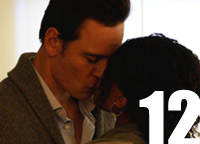 SHAME (Steve McQueen)
SHAME (Steve McQueen)
Fox Searchlight. December 2nd.
Brandon only has room for one thing in his life. His apartment and office are as barren as his emotional life. Michael Fassbender enters the picture on a naked loop as he travels from bed to phone to bathroom, one day being any day and every day empty but for bodily functions and the pursuit of the next fix. It's the first of many smart decisions that Steve McQueen, one of the most exciting new cinematic voices to emerge in the past decade (see also: Hunger), makes in this visually spare but daringly operatic take on addiction. Shame isn't perfect -- for every "New York New York" segment -- a telepathic conversation? a sung monologue? -- there's another moment that's too on the nose. The best thing about Shame is McQueen's voyeuristic addiction to the contact high of great actors. His camera stalks them ceaselessly but wisely never gets in their way, freezing in place to watch them work their inimitable magic.
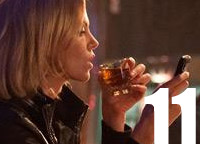 YOUNG ADULT (Jason Reitman)
YOUNG ADULT (Jason Reitman)
Paramount. December 9th
The first painful chortle of recognition I experienced watching Young Adult was the ease at which YA writer Mavis Gary (a brilliant Charlize Theron) became distracted from her work. A sentence or two, tops, was all she could manage before she was on to more pressing things like e-mail, Diet Coke, pet care (of sorts), and other absent-minded rituals. Sigh. I know the feeling on all counts. It was the first chortle of many. Reitman and screenwriter Diablo Cody, who previously made Juno together, make another compelling case for continued partnership here in this diamond sharp perfectly condensed comedy about prolongued adolescence, untreated mental illness, and terrible cultural values (note how Mavis isn't the only one who worships her skin-deep beauty or encourages her self delusions).
P.S. It took me half an hour to write that paragraph and it's not even a good one! Thankfully I did not hatch any plan as spectacularly ill conceived as "return to hometown. steal ex-boyfriend away from wife and infant daughter" during the fitful pauses.
and now... the top ten.



